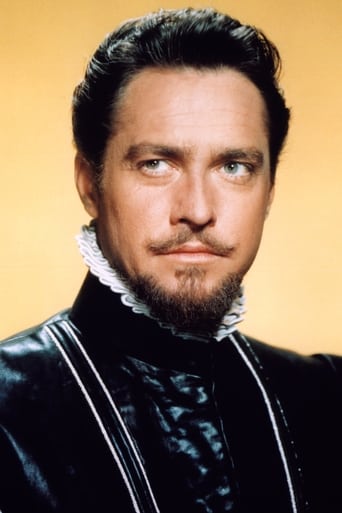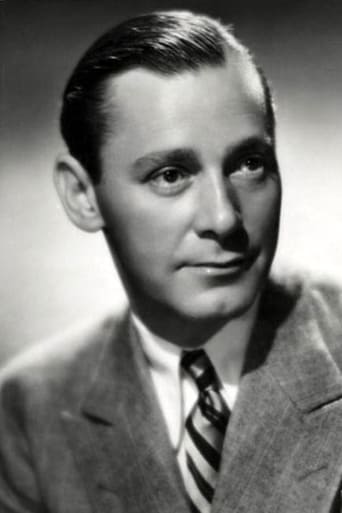Claysaba
Excellent, Without a doubt!!
CrawlerChunky
In truth, there is barely enough story here to make a film.
Deanna
There are moments in this movie where the great movie it could've been peek out... They're fleeting, here, but they're worth savoring, and they happen often enough to make it worth your while.
Marva
It is an exhilarating, distressing, funny and profound film, with one of the more memorable film scores in years,
inspectors71
The movie is 60 years old, made in the Land of Vanilla, the 1950s. And yet, there's a baby percolating in Joan Collins, I think I heard the word "slut" used, and damned if Bette Davis, as Elizabeth Tudor (with a hard-top) literally walks around as if she has a pair of big brass ones. I thought The Virgin Queen was going to be a cheesy costume drama. I was only partially right.Having enjoyed 1998's Elizabeth, I was looking for something that would add levels to the first Queen E. I got it. She was teetering on nuts (not the brass ones) in this flick. The smart part of her kept grabbing the wheel of state away from the crazy/isolated/monarch-with-a-vengeance part. I have never understood the cult of Bette Davis (I mean . . . yech), but I accepted Davis as this monarch. I think what made Davis work as Elizabeth was that she seemed to be having a whole lot of fun straddling that fence between crazy woman and uber-leader.The rest of the flick is so much Hollywood clanking of swords and clawing of eyes. I liked listening to Richard Todd (cool voice) as he pitches a golden dream to Liz. He was such a nothing--I kept thinking of all the other actors who could have been Sir Walter Raleigh--but I stuck with him. Things actually got interesting when he would mouth off at Davis, chewing her out, banishing her from his prison cell. If Davis wasn't your typical 1950s monarch, Todd wasn't going to fit the chivalrous mold either, and that helped this flick a lot.Which leaves us to Joan Collins. I liked her best when she was popping off to Todd, making him want her more. As one of Bette's ladies in waiting, she got to stand around looking pretty, call Todd a lap dog, and get into a lip lock with him in his apartment that led to a nice, long fade out and in. And you knew, you just had to know that Sir Walter, well, ahem.Wouldn't you? Joan, in her 20s, was smokin'! But how do you get by the Production Code with that long fade and the cuddly gazing out the window afterward?I can just see the young un's chortling in he theatre, and the grumps thinking, "Oh, my goodness! They seemed to have had relations. Herbert, we must go. This is smut!"I'm rambling. I liked The Virgin Queen, even if so much of it was pedestrian. I gained a little tolerance of Bette Davis. I still don't know why Richard Todd was a star (other than the salesman voice). Joan Collins was lovely, and I think her beauty peeked when she played Edith Keeler in an episode of Star Trek. After that, I think she started on her long string of bitchy cartoon characters.I never once felt much suspense. The costumes were cool, but the sets looked TVish. What made the movie work was the pushback against the man, censorship-wise.I still liked Kate Blanchett better.
MARIO GAUCI
16 years after portraying Queen Elizabeth I in Michael Curtiz's THE PRIVATE LIVES OF ELIZABETH AND ESSEX (1939), Bette Davis donned the garments of the fiery British monarch once more for this fine (if largely unhistorical) costumer about another tumultuous relationship of hers – with Sir Walter Raleigh (here played by the late Richard Todd, who died just the other day aged 90). Although Davis unsurprisingly dwarfs the rest of the participants in the acting stakes, she is still surrounded by a most able cast that also includes Joan Collins (as one of Elizabeth's ladies-in-waiting who, much to the latter's chagrin, becomes Mrs. Walter Raleigh and is carrying his child), Herbert Marshall (as the long-suffering Chancellor of England), Robert Douglas (as Elizabeth's villainous chief adviser), Dan O'Herlihy (as, controversially, an Irish lord and Raleigh's best friend) and Jay Robinson (as Douglas' reptilian henchman). There are some good lines (especially when Davis and Todd indulge in verbal sparring), two good fight sequences both involving Todd (a vigorous swordfight in a tavern at the start and an animated fistfight with Douglas towards the end), a serviceable score from Franz Waxman and, as is to be expected from a Grade-A studio product, the film is very handsome to behold (the costume designers nabbed its sole Oscar nod).
dbdumonteil
.....he was such a stupid git.That's what John Lennon sings in "I'm so tired" !But that's what's the Virgin Queen could have said of a man who was not afraid to challenge her even -for he is noble and chivalrous- if it's for Madam the Queen's glory.Koster's directing is static and unexciting and if the movie is interesting ,all the credit is due to the actors:Bette Davis was unique and irreplaceable ;her portrayal is so stunning we've got the strange feeling to see the real queen as she was .Richard Todd was used to this kind of aristocratic characters:the following year ,he would be Axel Fersen,opposite Michele Morgan's "Marie-Antoinette,Reine de France" by Jean Delannoy.And Joan Collins provides adequate if not outstanding support.
theowinthrop
This film is not great, but it is also undeservedly forgotten. Think of Elizabeth I and Bette Davis and everyone recalls THE PRIVATE LIVES OF ELIZABETH AND ESSEX, the Warner Brothers film with Davis and Errol Flynn made in 1939. This film, made in the middle 1950s (when Davis's career was on a downturn)has Richard Todd, a better actor than Flynn but not with half of the latter's charm and charisma. Also the plot is listless. Basically it should be called WHEN SIR WALTER CAME TO COURT, because it is how Raleigh enters Elizabeth's court and rises to her attention. But aside from his rivalry with Sir Christopher Hatton (Robert Douglas, in a well performed semi-villain role), which leads to the death of Dan O'Herlihy (Raleigh's friend) there is no tension in the plot - even with Joan Collins as a youthful beauty at court who becomes Elizabeth's rival.The real problem is the script writer did not know what to do with the project. ELIZABETH AND ESSEX was based (for better or worse) on a popular play of the time by Maxwell Anderson. It detailed the tragic relationship of the elderly Queen and her youthful lover, who was too hot-headed and too ambitious. It ends with Essex's rebellion of 1601, and his execution which (one can see) destroys the Queen as well. There was plenty of tension in that film, and one of the joys of it is watching how from the start every character knows how to play Essex's headstrong behavior against him. He literally destroys himself, taking his monarch with him.Raleigh's character appeared in that film (Vincent Price played the role) as a rival of Essex. And they were rivals. But Essex, aside from some fitful abilities as a military leader, had nothing in him. Raleigh and Robert Cecil (Essex two successful adversaries) were gifted in various ways: Cecil was a brilliang politician and statesman, and Raleigh a gifted poet, writer, and explorer of the New World. While Essex has never been forgotten, most people are better acquainted with Raleigh (who eventually became a political martyr as well - being executed for treason in 1618 when King James I was "disappointed" that Raleigh's South American explorations did not bring in the gold of El Dorado to England). Cecil/Salisbury is better recalled to scholars of Elizabethan history, but he was quite a master-success. He was the first Earl of Salisbury, and his family remains a leading set in the British Aristocracy to this day (one of them, Robert Gascoigne Cecil, Marquis of Salisbury, was Queen Victoria's last Prime Minister from 1895 - 1902).A good film about Raleigh would actually concentrate on his various careers as writer, explorer, and would-be colonist. It would show his major achievement as a writer: THE HISTORY OF THE WORLD, and go into his attempts to finance exploration of North America (the "Lost Colony" of Roanoke was created by Raleigh's plans). It would end in the tragedy of 1618, and the ingratitude of a particularly obnoxious monarch. Raleigh did not find El Dorado, and his oldest son died in the attempt to settle a colony in South America. However, his expedition created the British territory of British Guiana (now the nation of Guyana)which is the only English speaking country in South America.That, alas, is not the case with THE VIRGIN QUEEN. Set in the 1580s, Raleigh arrives in the court dominated by the Queen's oldest (and probably truest love), Robert Dudley, Earl of Leicester (Herbert Marshall), and by Leicester's rival Hatton (Elizabeth's fairly able Chancellor of Exchequer). Leicester goes to lead a military team who are assisting the Dutch. He died in the Netherlands in 1587 (his death occurs off screen here). Hatton, happy to be rid of his rival finds Leicester's place filled by that upstart Raleigh, and this goes into a long, increasingly bitter rivalry that ends with the death of Dan O'Herlihy. Raleigh decides to leave the court, as he has fallen in love with Bess Throckmorton (which displeases the Queen) and he wishes to explore the New World, but Elizabeth convinces him to remain at court - even allowing him to marry Bess (which he did do).It's not an exciting story at all. They try to pump excitement into it, but Douglas (while good as Hatton) seems to frivolous a character to take seriously. Actually this is quite true in a sense: Elizabeth actually was first attracted to Hatton by his graceful dancing. It just turned out he was a competent public servant as well. The tragedy of O'Herlihy's death is sad but not enough to really make the film tense and interesting (it also comes too late in the film to do much good). While well mounted it is not a good historical movie.Ironically Davis was closer in age to the age of Elizabeth when she made this film, as opposed to ELIZABETH AND ESSEX, where she was playing an older version of Elizabeth when she (Davis) was younger. I think I prefer her performance when she was younger.




